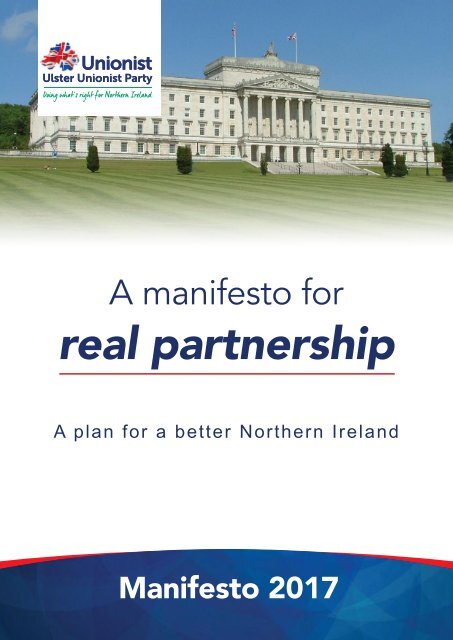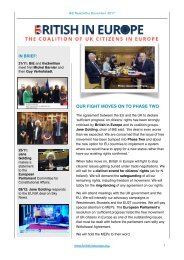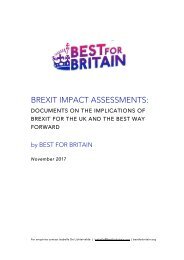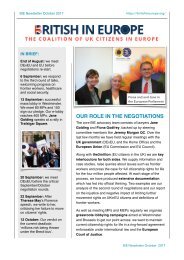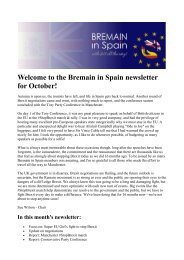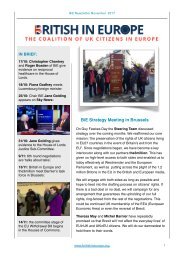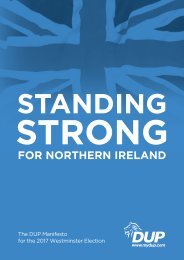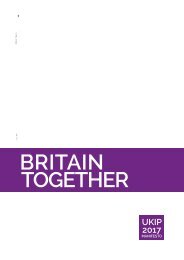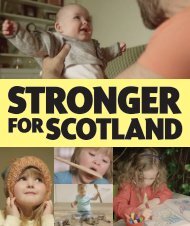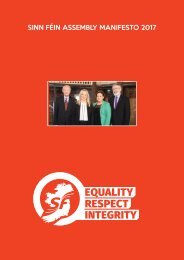You also want an ePaper? Increase the reach of your titles
YUMPU automatically turns print PDFs into web optimized ePapers that Google loves.
A manifesto for<br />
real partnership<br />
A plan for a better Northern Ireland<br />
Manifesto 2017
Table of Contents<br />
Time to vote for change.............................................................................................................................. 3<br />
Partnership not Domination......................................................................................................................... 4<br />
Our five point plans..................................................................................................................................... 8<br />
A vision for Northern Ireland outside the European Union...................................................................... 12<br />
Supporting the NHS at this time of crisis and promoting public health................................................... 16<br />
Giving our children every chance of success............................................................................................. 18<br />
Working together, growing together........................................................................................................ 20<br />
Keeping our people safe........................................................................................................................... 22<br />
Ensuring adequate housing for all............................................................................................................. 24<br />
Building our infrastructure network.......................................................................................................... 25<br />
Protecting nature and tackling environmental threats.............................................................................. 26<br />
Sustaining rural communities and our agri-food industry......................................................................... 27<br />
Supporting all people across our community............................................................................................ 28<br />
2 | The <strong>Ulster</strong> Unionist Party | Manifesto 2017
Time to vote<br />
for change<br />
Too many of our people go away to study at university and never come back. I am in the minority, a student who<br />
did return. I have never regretted it. I love Northern Ireland. I love the island of Ireland. I love the place and its<br />
people.<br />
We excel at so much: actors, artists, musicians; inventors, industrialists, sports men and women; the list of high<br />
achievers who have helped us “box above our weight” is endless. Yet the poisonous divide that runs through our<br />
community continues with disastrous implications for our communal wellbeing and international reputation.<br />
Some parties will ask you to vote on 2nd March on those old ‘Orange and Green’ lines. I ask you to concentrate<br />
on whether we want to have proper democracy in Northern Ireland, because if you do, this is about what voters<br />
do at elections – they either reward the government for a job well done, or give the opposition their turn to try to<br />
do better.<br />
If ever there was an election that cried out for a vote for change, this is it!<br />
On the day you read this, £85,000 of your money has literally gone up in smoke thanks to the botched Renewable<br />
Heat Incentive; and it will be the same tomorrow and the day after and the day after that – money we need for our<br />
Health Service, our schools and universities and all our beleaguered public services.<br />
A vote for the <strong>Ulster</strong> Unionist Party this time is a vote for change to proper partnership government, based on<br />
respect, building trust, and the shared objective of making Northern Ireland work.<br />
On the 2nd of March, I ask you to vote <strong>Ulster</strong> Unionist.<br />
On the following pages, I offer a more detailed vision of unionism for Northern Ireland’s second century –<br />
Partnership, not Domination.<br />
Manifesto 2017 | The <strong>Ulster</strong> Unionist Party | 3
Partnership not<br />
Domination<br />
As local politics stumbles incoherently towards Northern Ireland’s centenary, it seems an appropriate time to define<br />
unionism for the second century.<br />
A real fresh start, if you like, but unlike the false dawn of the previous DUP / Sinn Féin effort. In fact, the words of the<br />
original fresh start document, the Belfast / Good Friday Agreement of 1998, remain a guiding light to unionism for<br />
our second century. It is a matter of profound regret that the public discourse on that agreement has not focused<br />
on the underpinning values we and the SDLP sought to embed into our politics.<br />
The key paragraph from the Agreement’s opening Declaration of Support is worth revisiting:<br />
‘The tragedies of the past have left a deep and profoundly regrettable legacy of suffering. We must never<br />
forget those who have died or been injured, and their families. But we can best honour them through a fresh<br />
start, in which we firmly dedicate ourselves to the achievement of reconciliation, tolerance, and mutual trust,<br />
and to the protection and vindication of the human rights of all.’<br />
19 years on, I doubt many would conclude we have done well in advancing reconciliation, tolerance or building<br />
trust.<br />
In the very last week of the failed 2016-2021 mandate, one of the younger DUP MLAs summed it up in the<br />
debating chamber in Parliament Buildings:<br />
”This party, over the last 10 years, has made a huge effort to move Northern Ireland forward in the right<br />
direction, even though it is very difficult to do business with a party that we do not want to do business with<br />
and, as one of our party members quite rightly said, when sometimes we have to hold our noses to do that<br />
business.”<br />
Not only is there no sweet smell of cooperation, the tenth year of DUP / Sinn Féin control has seen the whiff of<br />
something unedifying. Incompetence, arrogance and allegations of corruption are not unionist values, nor should<br />
they be the values of anyone occupying Stormont Castle, the home of the Northern Ireland Executive.<br />
Unionism must imagine better for Northern Ireland’s second century: a coalition of the willing; parties seeking<br />
proper partnerships; leaders who want to share space, power and responsibility because they understand it is for<br />
the greater good, not simply because the law says sharing is compulsory.<br />
Imagine a Northern Ireland where the Health Service actually works as intended, with an economy that generates<br />
serious wealth for our people, generating the taxes that fund public services that are the envy of others. There is<br />
nothing orange or green about making Northern Ireland work, an aspiration I hear articulated by Colum Eastwood<br />
as often as I say it myself. Of course, his motivation is different, focused on making us more attractive to a future<br />
united Ireland; but that is no inhibition to a collective effort to improve the lot of all our people.<br />
Imagine a single education system, where children mix from age four, receiving a virtual inoculation jab against<br />
sectarianism, but which also protects a family’s right to education within a religious context.<br />
4 | The <strong>Ulster</strong> Unionist Party | Manifesto 2017
Imagine a country that actually heeded the warning of Edward Carson from a hundred years ago about the need<br />
for a shared future. Speaking in the House of Commons in 1920, as Northern Ireland was being established, his<br />
warning to the politicians who would eventually populate Stormont was clear:<br />
“They must forget faction and section …… If <strong>Ulster</strong> does what I ask her to do, and what I hope and believe<br />
she will do, in setting up an example and a precedent of good government, fair government, honest<br />
government, and a government not for sections or factions, but for all, her example may be followed …”<br />
That’s what we must commit to for Northern Ireland’s Second Century: a fair, honest government for all, blind to<br />
factions and sections, advancing diversity for what it is, something greater than the sum of the parts.”<br />
In his classic novel The Adventures of Huckleberry Finn, Mark Twain draws a striking metaphor from the dinner<br />
table:<br />
“When you got to the table you couldn’t go right to eating, but you had to wait for the widow to tuck her<br />
head down and grumble a little over the victuals, though there wasn’t really anything the matter with them.<br />
That is, nothing only everything was cooked by itself. In a barrel of odds and ends it is different; things get<br />
mixed up, and the juice kind of swaps around, and the things go better.”<br />
Twain was, of course, discussing America’s Deep South at a time when most black men and women were not free.<br />
You might think our challenges are minor by comparison but the principle remains. Do we truly value sharing? Is it<br />
understood that when things get mixed up, they go better?<br />
It’s not about everyone jumping into a virtual blender and emerging the human form of beige. It’s about changing<br />
the signs in the pub window from “No sports tops” to “All sports tops welcome”, cherishing and celebrating<br />
difference.<br />
It’s about transforming society so people feel prosperous, not only economically but in mind and body.<br />
I yearn for an Executive built on a proper partnership, based on trust, equality and mutual respect. I want to Clean<br />
Up Stormont, and have published a Five Point Plan, covering: greater accountability for Ministers and for their<br />
Special Advisers; electing a Speaker by secret ballot, as they do in London, Dublin, Cardiff and Edinburgh; giving<br />
statutory committees a legal duty to scrutinise the work of Executive departments, not just “assist and advise”;<br />
ending the abuse of Petitions of Concern, and; greater transparency in politics, including financial donors.<br />
As a Victims Commissioner, it was immediately clear that while victims and survivors are not a homogeneous<br />
group, there were common themes, like the fact there was a reasonable expectation that in the wake of the terrible<br />
event that made them victims, the state and its services would form the wagons in a circle and protect them and<br />
their families, but too often, the opposite happened.<br />
I sat in the Crowne Plaza Hotel in south Belfast on the 20th of January, as Sir Anthony Hart delivered his report into<br />
Historical Institutional Abuse. I was surrounded by victims, some of whom had waited decades for this moment.<br />
41 times – forty-one – Sir Anthony used the word “systemic” or “systematic” in describing the abuse carried out in<br />
the institutions he reviewed. Is it any wonder the victims felt vindicated? But they were also left deeply frustrated,<br />
because Sir Anthony’s recommendations sit in a report delivered to the Executive Office in Stormont Castle, and<br />
that department is effectively closed to those victims. That is the ultimate obscenity of this political crisis – that<br />
Manifesto 2017 | The <strong>Ulster</strong> Unionist Party | 5
people whose early years were cruelly and brutally scarred by those in whom the state put its trust, find in their<br />
later years justice and redress is, Tantalus-like, just out of reach.<br />
It’s not an experience exclusive to victims. A quarter of a million of our people are on some form of NHS Waiting<br />
List; meanwhile, GPs threaten rebellion. In education, the same families see children under achieve at school,<br />
generation after generation; meanwhile, issues like post-primary transfer arrangements remain unresolved. And<br />
our economy continues to suffer the imbalance of an under-developed private sector; meanwhile our people are<br />
less well off than our counterparts in Great Britain.<br />
The Executive’s own Budget document for 2016-2017 makes that clear, using Gross Value Added (GVA), recognised<br />
as “a broad measure of living standards”, that if someone in GB has £1 in their back pocket, our people are lucky<br />
to have 80p.<br />
Over the last two decades, Northern Ireland’s GVA per head has remained consistently at around 75 to 80 percent<br />
of the UK average – peaking at 83.7 percent in 2007.<br />
It is noteworthy that the gap was at its narrowest in 2007, the year the DUP and Sinn Féin took charge of the<br />
Executive.<br />
It is time unionism received the leadership that accurately reflects its positive values; time for politics to catch<br />
up with the people; time to recognise identity is not binary. My parents were Belfast traders, of <strong>Ulster</strong> Scots and<br />
French Huguenot heritage – so were Henry Joy McCracken’s!<br />
As John Hewitt put it:<br />
‘Firstly, I am an <strong>Ulster</strong>man steeped in the traditions of this place. Secondly, I am Irish, of this Ireland. Thirdly,<br />
I am British, and finally, in a more diffuse way, I am European. It may make it easier for you to understand if<br />
you remove one of those elements but if you do you are no longer describing who I am.’<br />
For this modern world, I would add we should all have a sense of being global, not just European citizens.<br />
Unionism for Northern Ireland’s second century needs to offer better than has been demonstrated over the last<br />
decade at Stormont – something offering integrity, something honourable, delivered by people who will put<br />
the country’s interests ahead of their party’s, who understand there is such a thing as the common good and the<br />
greater good. We must try to inspire and excite, at the same time reassuring them that we care for our community<br />
above our own petty self-interest.<br />
Unionism means being united. Our second century must promote greater unity among our people than ever<br />
before; uniting education, business, industry, the public services, the Opposition at Stormont, and above all else,<br />
uniting the coalition government in united objectives, united principles, united beliefs – a government that is<br />
finally fit for purpose!<br />
We will enter Northern Ireland’s second century suffering 21st Century problems, not least our appalling rates of<br />
poor mental health and well-being. I have campaigned on this subject for over four years now, and while there is<br />
now a broad political consensus it is a massive issue, we have yet to take decisive action. If we do, we achieve a<br />
triple win: addressing one of the most toxic legacies of the conflict; helping those trapped unwillingly on benefits;<br />
and in helping people become economically active, we rebalance the economy. But above all that, we restore<br />
some dignity and purpose to the lives of so many who wake each morning denied a proper sense of purpose in<br />
their lives.<br />
6 | The <strong>Ulster</strong> Unionist Party | Manifesto 2017
Mental health is something we could agree to action immediately, as a first step to dealing with the past. It is cruel<br />
to acknowledge the problem but leave it lingering because parties want a “nothing is agreed until everything is<br />
agreed” approach. In all humanity, these people need help today.<br />
We may not be able to solve all our great problems in a single act, or mandate, but as the great Russian writer,<br />
Ivan Turgenev puts it:<br />
‘If we wait for the moment when everything, absolutely everything is ready, we shall never begin.’<br />
This country needs a new beginning. The Assembly Election is that opportunity, but only if we stop voting Orange<br />
and Green and embrace democracy, where the parties of government are judged on performance and those in<br />
opposition are told if they are to be given the chance – to do better.<br />
Manifesto 2017 | The <strong>Ulster</strong> Unionist Party | 7
5<br />
Point<br />
Plan<br />
Health<br />
• Tackling the waiting lists crisis to prevent<br />
patients coming to any further harm<br />
• Stabilising and reassuring our medical<br />
workforce<br />
• Merging the five Health and Social Care Trusts<br />
into one<br />
• Introducing a legal duty of candour and a<br />
Suicide Prevention Bill<br />
• Placing much greater emphasis on prevention<br />
Education<br />
• Plan for the future of a desegregated<br />
education system<br />
• Deal with systemic issues like<br />
underachievement and post-primary transfer<br />
• Delivering affordable childcare across<br />
Northern Ireland<br />
• Develop proposals for Early Years provision<br />
for all children 0-5<br />
• Prepare young people for life and the<br />
workplace<br />
Justice<br />
• Increasing PSNI numbers to 7,500<br />
• Supporting our Prison Service<br />
• Tacking paramilitary activity, criminality and<br />
organised crime<br />
• Rebalancing the justice system<br />
• Rebalancing legacy investigations<br />
Housing<br />
• Building more social and affordable homes<br />
• Tougher planning application targets<br />
• Supporting private tenants<br />
• Introducing a statutory duty to tackle<br />
homelessness<br />
• Utilising the NIHE borrowing power<br />
8 | The <strong>Ulster</strong> Unionist Party | Manifesto 2017
Infrastructure<br />
• Prioritising the York Street Interchange<br />
• Tackling traffic bottlenecks<br />
• A sustainable roads maintenance budget<br />
• A new agency for major public capital projects<br />
• Promoting Sustainable Travel<br />
Economy<br />
• 2% growth, 20% of economy in manufacturing,<br />
£20bn in value of exports by NI’s 2nd century<br />
• A framework to control costs, reduce subsidy<br />
and keep the lights on<br />
• We will deliver a simple plan which Unions and<br />
Employers want and need<br />
• Invest in R&D, keeping higher education<br />
accessible<br />
• Challenge Tourism Ireland to attract fair share<br />
of overseas market to NI<br />
Environment<br />
• Scoping study on benefits for Northern Ireland<br />
Climate Change Act<br />
• A new enforcement model for environmental<br />
crime<br />
• A new coastal erosion strategy<br />
• A statutory duty on tackling invasive species<br />
Farmers<br />
• Dealing with the implications of Brexit<br />
• Championing local produce<br />
• A fairer return for their produce<br />
• Identifying new export markets<br />
• Making agri-food an attractive career option<br />
• Maintaining and expanding our woodland<br />
cover<br />
Supporting our<br />
communities<br />
• Helping victims of the troubles<br />
• Supporting people with disabilities, and those<br />
that care for them<br />
• Tackling the blight of fuel poverty<br />
• Standing up for our LGB&T community<br />
• Looking after our older people with dignity<br />
Brexit<br />
• Honour the referendum decision to leave the<br />
European Union<br />
• Guarantee that no group is worse off as a<br />
consequence of Brexit<br />
• Lobby for unfettered access to the EU single<br />
market<br />
• Invest in infrastructure to enable NI to become<br />
‘The Gateway to the EU’<br />
• Ensure no hard border between NI and RoI, or<br />
between NI and GB<br />
Manifesto 2017 | The <strong>Ulster</strong> Unionist Party | 9
Cleaning up Stormont<br />
The last ten years of an Executive led by the DUP and Sinn Fein have been characterised by a descending spiral<br />
of incompetence, arrogance and the whiff of cronyism and corruption.<br />
Peter Robinson famously boasted the greatest achievement of the 2007-2011 mandate was that it survived. They<br />
cannot even manage that anymore. We have taken bold steps to encourage the institutions to evolve and mature<br />
in line with society, not least in creating an official opposition. But the DUP/SF Executive has dragged the<br />
reputation of Stormont from the gutter into the sewers.<br />
Nothing will change unless the public vote for it on the 2nd of March. We understand the public’s disgust with<br />
parties who put their own self-interest over the greater good. It is time to change the record of protecting individual<br />
politicians, be they Ministers or Assembly Speakers, not to mention Special Advisers and elect parties who will<br />
put the interests of the Country first.<br />
This must be a watershed moment for politics in Northern Ireland. Otherwise the cycle will begin all over again<br />
with the politics of fear and negativity.<br />
The public have a very clear choice - they can vote for parties who want a coalition of the willing, a partnership<br />
of parties offering mutual respect, building trust and sharing space, power and responsibility, because it’s<br />
the right thing to do for all our people.<br />
It begins with reform at Stormont. We have identified five areas in need of immediate action in order to clean up<br />
Stormont and stop the race to the bottom.<br />
Executive Ministers & Special Advisers<br />
Ministers must be accountable. There can be no<br />
more solo runs, incompetence or breaches of the<br />
Ministerial Code without consequence. Ministers<br />
alleged to have broken the Code must face<br />
investigation. We currently have the situation where<br />
an MLA can have their conduct investigated by the<br />
Assembly Commissioner for Standards, yet there is no<br />
such process for Ministers. It cannot continue to be<br />
the case that there is a greater level of accountability<br />
placed on MLAs, than on those being trusted with the<br />
public purse.<br />
We would legislate to expand the Assembly<br />
Commissioner for Standards remit to allow alleged<br />
breaches of the Ministerial Code to be reported and<br />
investigated.<br />
Yet on too many occasions Executive SPADs have<br />
become the headline. It is time that Special Advisers<br />
became subject to the Northern Ireland Civil Service<br />
disciplinary process to ensure public confidence in<br />
their accountability.<br />
We must also end the situation where some Special<br />
Advisers are paid more than an Executive Minister. In<br />
the new mandate their salaries must be capped.<br />
The past number of years have seen the Executive<br />
embroiled in many scandals, including Red Sky,<br />
NAMA and RHI. These have raised allegations around<br />
the actions of Ministers and their Special Advisers. If<br />
any of these allegations were to be substantiated it is<br />
vital that the PSNI has the will and required resource<br />
base to deal with any referrals.<br />
The role of a Special Adviser is to assist Ministers in<br />
running the country and protecting the public purse.<br />
10 | The <strong>Ulster</strong> Unionist Party | Manifesto 2017
Election of Speaker<br />
It is vital that the public and the Assembly can have<br />
confidence in the impartiality of the Speaker. In the<br />
last mandate this was brought into disrepute.<br />
The election of the Speaker can no longer be subject<br />
to a carve-up between the two largest parties. We<br />
want to see future Speakers elected through a secret<br />
ballot of MLAs.<br />
Scrutiny Committees<br />
Executive Ministers must be effectively scrutinised.<br />
That role should be performed by the Assembly’s<br />
statutory committees, yet their legal duty is to “advise<br />
and assist” Ministers, not scrutinise them. We want to<br />
strengthen the role of Assembly Committees, making<br />
effective, detailed scrutiny a statutory duty.<br />
Petitions of Concern<br />
We must put an end to the abuse of Petitions of<br />
Concern, which were designed specifically to protect<br />
minority interests, not political parties. No one<br />
envisaged the situation where one party had sufficient<br />
MLAs to bring forward a PoC on their own. This has<br />
corrupted the intent of the PoC, allowing one party<br />
to hold a veto over the Assembly. The Petition of<br />
Concern was designed to be a valuable mechanism<br />
to protect minorities from harmful law changes.<br />
Instead we have seen it deployed to protect Nelson<br />
McCausland, Sammy Wilson and most recently the<br />
Speaker Robin Newton from criticism.<br />
The reduction in the number of MLAs sees the need<br />
for a review of the operation of the Petition of Concern<br />
mechanism. We would propose a requirement that<br />
the signatories must come from more than one party,<br />
this maintains the original intent of the petition while<br />
limiting opportunities for misuse.<br />
Transparency in Political Donations<br />
The time is right to introduce transparency in political<br />
donations. The public want openness at the heart<br />
of government, something the DUP and Sinn Fein<br />
Executive has a shabby record of.<br />
We want the public to have confidence in the decision<br />
makers, and providing them with the information on<br />
who is making donations to political parties would be<br />
an important step in the right direction.<br />
We have written to the Secretary of State proposing<br />
that records of donations to political parties are<br />
published from the start of the 2017/2018 financial<br />
year.<br />
Clean Up<br />
Stormont<br />
Manifesto 2017 | The <strong>Ulster</strong> Unionist Party | 11
A vision for Northern Ireland outside the European Union<br />
A vision for Northern Ireland outside the European Union<br />
12 | The <strong>Ulster</strong> Unionist Party | Manifesto 2017
It was a humiliation and absolute disgrace that during the discussions in Parliament on the triggering of Article 50,<br />
Northern Ireland was left floundering with no Assembly or functioning Executive.<br />
During the EU referendum campaign, the <strong>Ulster</strong> Unionist Party recommended that, on balance, it was beneficial<br />
for Northern Ireland to remain within the European Union. However, the decision of the 23rd June 2016 was that,<br />
the people of the United Kingdom voted to leave the European Union. The days of being a ‘Remainer’ or a<br />
‘Brexiteer’ are now over. The focus must now be on achieving the best deal for Northern Ireland.<br />
The Brexit vote has opened up an era of uncertainty. The Northern Ireland Executive has a duty to provide clarity,<br />
and has fundamentally failed to do so. As a house divided the DUP and Sinn Fein have had no leverage in Brexit<br />
discussions, in fact when the Secretary of State for Exiting the European Union, David Davis MP visited Northern<br />
Ireland in August he held separate meetings with Executive Ministers, who had no common position. It was an<br />
embarrassment.<br />
While the Scottish Government and the Welsh Government have submitted substantive policy submissions to the<br />
Joint Ministerial Committee, the best the Northern Ireland Executive could manage was a 2 page letter, sent in<br />
August outlining concerns all of which were obvious before the referendum. With the DUP/Sinn Fein Executive<br />
crumbling after only 8 months, the Northern Ireland voice is now completely absent from the Brexit discussions.<br />
Northern Ireland will be the most impacted by Brexit and yet is the least prepared.<br />
While others have sat by idly in the aftermath of the Brexit vote the <strong>Ulster</strong> Unionist Party has been proactive,<br />
establishing an Advisory Panel consisting of representatives from business, academia, the community &<br />
voluntary sector, unions, agri-food and farming, all sectors which could be heavily impacted by Brexit. As a result of<br />
discussions with the Advisory Panel, in September we published our document ‘A vision for Northern Ireland<br />
outside the EU’, outlining our vision, a plan to achieve that vision and key asks which must be delivered.<br />
Prior to Brexit Northern Ireland already has pre-existing economic difficulties. We rely on an annual subvention<br />
from Westminster of approximately £9 billion, physical and technological infrastructure is underdeveloped, and we<br />
lie twelfth out of 12 UK regions in terms of productivity and consequently have a living standards gap with the rest<br />
of the United Kingdom. The 2015/16 Budget Document stated that while the local economy was showing signs of<br />
growth, relative living standards - measured by GVA per capita - still remained stubbornly below the UK average<br />
(standing at around 76 per cent of the UK average). To put this in perspective, if someone in Leeds, Manchester or<br />
Aberdeen has £1 in their pocket, in Northern Ireland we have 76 pence.<br />
Brexit brings with it additional difficulties. Northern Ireland is due to receive almost €3.4 billion over the current EU<br />
budget period 2014-2020, with additional funds expected from centrally managed EU programmes. While funding<br />
secured before the UK leaves the European Union has been guaranteed by the UK Government, uncertainty still<br />
exists regarding replacing this funding after 2020.<br />
Some of the challenges include:<br />
• Farmers will receive close to €2.3 billion in direct payments over this EU budget period, with a further<br />
€228 million rural development funding going to rural communities. While this has been guaranteed<br />
until 2020 by the Treasury, no clarity exists for what will happen after this date;<br />
• Access to the market for agricultural products post-Brexit is also a concern, with high tariff walls<br />
surrounding the Common Agricultural Policy. Agricultural goods are not included in either the<br />
Customs Union, or by membership of the European Free Trade Association;<br />
Manifesto 2017 | The <strong>Ulster</strong> Unionist Party | 13
• The potential loss of EU central funding programmes in the future, such as the Connecting Europe<br />
facility, used for key infrastructure projects of which the York Street Interchange is an example;<br />
• The potential inability to access the €145 million of Horizon 2020 research funding targeted by the<br />
Executive, which is vital for our universities to make progress in key areas through collaborative<br />
projects and key for our local businesses to innovate through research & development and Innovation;<br />
• The future of the border, given that a potential ‘hard border’ with the Republic of Ireland could<br />
adversely affect cross-border trade, which is vital for the Northern Ireland economy, or the<br />
implications of a hard border around Great Britain;<br />
In the Prime Minister’s recent keynote Brexit speech in Lancaster House, Theresa May outlined that the UK will be<br />
leaving the Single Market, and will not be seeking full membership of the Customs Union. It is therefore important<br />
that in negotiations with the EU that a deal is reached which delivers unfettered access to the single market, and<br />
tariff free trade, which is particularly crucial for the future of cross border trade. It was however encouraging that<br />
she noted it was a priority of the Government to maintain the Common Travel Area.<br />
In the <strong>Ulster</strong> Unionist Party, we are very clear that, while there are challenges, we take a positive view of the<br />
opportunities that Brexit does present, and we have a vision to move Northern Ireland forward outside of the<br />
European Union.<br />
Our vision for the future of Northern Ireland in the post-Brexit era, is as the ‘UK’s Gateway to Europe’.<br />
To make it happen, we have identified 10 key “Asks” for the Northern Ireland Executive to deliver, working as<br />
appropriate with HM Government:<br />
1. Infrastructure investment to be trebled<br />
Investing in our hard infrastructure to make Northern<br />
Ireland Brexit ready. This will require making the case<br />
to HM Government to invest some of the funding<br />
currently being directed to Brussels.<br />
2. A Northern Ireland wide Enterprise Zone<br />
Creating an attractive investment proposition based<br />
around rates relief, capital allowances, enhanced<br />
research & development, to make Northern Ireland a<br />
more attractive place to do business.<br />
3. A step change in education and skills<br />
Maximise the potential of our people by making our<br />
education and training systems the best in the class.<br />
To address the shortfalls and skills gaps student visas<br />
should become a devolved matter, to ensure the right<br />
skills are in the right places.<br />
4. Financial guarantees for those losing EU<br />
funding<br />
There must be a guarantee that no group in Northern<br />
Ireland is financially worse off for a minimum of five<br />
years after we exit the EU. This includes our universities,<br />
our community & voluntary sector, and our farmers<br />
who Arlene Foster said would be resourced ‘as well, if<br />
not better’ after Brexit.<br />
5. Enhanced investment in Research &<br />
Development and Innovation<br />
We must build on our Research & Development<br />
capacity, and encourage HM Government to enhance<br />
14 | The <strong>Ulster</strong> Unionist Party | Manifesto 2017
investment, in Research & Development beyond the<br />
London-Oxford-Cambridge triangle. Such a move<br />
will boost our productivity and consequently improve<br />
living standards.<br />
6. Safeguards for the Common Travel Area<br />
Ensure that people in Northern Ireland retain the right<br />
to unfettered access to all parts of the island of Ireland,<br />
while negotiating new international agreements with<br />
the Republic of Ireland to ensure that Northern Ireland<br />
does not become a backdoor for illegal immigration,<br />
and that the border does not become subject to<br />
increased illegal activity.<br />
7. No “hard border” at Great Britain’s ports and<br />
airports<br />
Confirm that Northern Ireland’s citizens will not face<br />
a hard border at Great Britain’s ports and airports.<br />
Maintaining the Common Travel Area should not<br />
come at the expense of facing a hard border when<br />
people from Northern Ireland travel to other parts of<br />
the United Kingdom.<br />
Minister ruling out full membership of the Single<br />
Market, it is crucial that the deal reached with the EU<br />
obtains the maximum possible access to enable the<br />
continuance of free trade across Europe.<br />
9. Define the devolved policies to apply in the<br />
post-Brexit era<br />
While Brexit will give us the opportunity to adjust,<br />
reform or reject obligations, it is essential that this<br />
does not lead to an unregulated scenario where there<br />
no longer stringent obligations regarding protecting<br />
our natural environment or employment rights.<br />
10. A re-imagined Peace Centre<br />
Finally, rather than allowing the continued stalemate<br />
to continue around the previous proposal to build a<br />
so-called Peace Building and Conflict Reconciliation<br />
Centre at the Maze, the Executive should engage the<br />
EU in funding a peace centre at an alternative venue,<br />
at a location which is without controversy and can<br />
enjoy the support of the whole community.<br />
8. Unfettered access to the EU’s Single Market<br />
Ensure our consumers and businesses have continued<br />
access to the European Single Market on terms no<br />
less favourable than currently enjoyed. With the Prime<br />
Manifesto 2017 | The <strong>Ulster</strong> Unionist Party | 15
Supporting the NHS at<br />
this time of crisis and<br />
promoting public health<br />
Our health service is in crisis. Never before have so many people been waiting so long for key diagnoses or<br />
treatment. Health officials and our medical staff in hospitals across Northern Ireland have been repeatedly warning<br />
of the danger of making seriously ill or infirm people wait for treatment. They haven’t been listened to. In a<br />
previously leaked document the Health and Social Care Board bluntly warned that ‘increased waiting times for<br />
assessment may result in delayed diagnosis of a serious or life-threatening condition with reduced likelihood of a<br />
successful outcome.’ Yet, from the time of that comment two years ago the environment is now unrecognisable<br />
given the sheer numbers of people involved.<br />
Few aspects of the National Health Service are unaffected. Through in-depth questioning by <strong>Ulster</strong> Unionist MLAs<br />
it has been possible to draw a picture of the overall severity of the crisis;<br />
• The number of outpatients forced to wait longer than 52 weeks for their first appointment with a<br />
consultant jumped from 20,000 to over 40,000 in the last year alone. As an illustration - over half<br />
(54%) of all spinal patients have been waiting longer than a year;<br />
• Almost 20,000 operations were cancelled over the last four years for no clinical reason, often at the<br />
last minute and often because a surgeon or theatre was not available;<br />
• The number of children currently waiting for key autism spectrum assessments has increased by 280%<br />
over the last five years;<br />
• Worrying trends of sickness absence, particularly for stress related conditions, have been developing<br />
amongst key medical staff groups;<br />
• The costs paid to locum staff have increased by almost 100%, with a record £230m being paid to<br />
agency staff over the last five years;<br />
• 999 emergency ambulance calls are taking longer to be picked up and responded to;<br />
• Fewer Fire and Rescue Service vehicles are arriving on the scenes where there is a significant risk to<br />
life within their recommended 6-minute target.<br />
Last October, in a statement to the Assembly, the Sinn Fein Health Minister said that our health system was<br />
at breaking point. We agree. She proposed that whole-system transformation across primary, secondary and<br />
community care, and a change to the way in which services are accessed are all required. We also agree with that.<br />
Yet the Department’s response to the Bengoa Report was uninspiring. It was bereft of substance, detail, or even<br />
the most basic of targets. Now it risks being left on a shelf, already bulging with other unimplemented reports.<br />
The next five years will be a defining period for our health service. Standing still simply is not an option. The gap<br />
between capacity and demand is widening at a frightening rate. Unless changes are made the current situation<br />
will continue to deteriorate and tragically more and more patients will come to harm as a result. So we accept the<br />
need for reform. The <strong>Ulster</strong> Unionist Party is up for taking part in those difficult decisions.<br />
Recent detailed <strong>Ulster</strong> Unionist policy papers on supporting people with poor mental health and wellbeing and<br />
cancer care are available at www.uup.org<br />
16 | The <strong>Ulster</strong> Unionist Party | Manifesto 2017
Tackling the waiting lists crisis<br />
We firmly believe the first issue that any new Executive<br />
must face and tackle is the shameful length of time<br />
that increasing numbers of patients are being forced<br />
to wait. We recognise that in order to reduce the lists in<br />
the short-term, it will be necessary to radically increase<br />
capacity and that it will require a funding allocation.<br />
Given both the DUP and Sinn Fein pledged an extra<br />
£200m a year for the health service we believe this<br />
money is available. In the longer term we will allow<br />
GPs to make direct referrals for key diagnostic tests,<br />
therefore eliminating a middle tier of outpatient waits,<br />
as well as transforming the provision of community<br />
and social care places so that we avoid the 68,000<br />
‘bed-blocked’ days Northern Ireland’s Hospitals<br />
experienced last year.<br />
Stabilising the workforce<br />
Claims by others of increasing frontline staff don’t<br />
stand up when the number of vacant posts are<br />
investigated. For instance, at the end of 2016 there<br />
were 920 vacant nursing posts alone. A long-term<br />
empty post is as much benefit as no post at all. Serious<br />
gaps across the medical workforce are also one of the<br />
key contributing factors to our spiralling locum costs.<br />
We would commission a full medical workforce plan<br />
identifying the areas of unmet need, breaking the<br />
current silo approach, and doing so every three years.<br />
A single Health and Social Care Trust<br />
The <strong>Ulster</strong> Unionist Party implemented the last major<br />
reforms of administration of the Northern Ireland<br />
Health Service. It’s now time for a second tranche. We<br />
would amalgamate the existing five Trusts into one,<br />
putting it under the stewardship of one accountable<br />
Chief Executive. We would learn from the model of<br />
the Policing Board, with day to day health services<br />
preferably run by the Chief Executive and their senior<br />
management team, overseen by a Board populated<br />
by medical experts, representatives of civic society<br />
and politicians. The Board would hold the NHS<br />
management to account, but the Chief Executive<br />
would be operationally independent. We believe the<br />
immediate objective of this new single Trust must be<br />
tackling the unacceptable variance in treatment times<br />
faced by patients as a result of simply where they live.<br />
Protecting primary care<br />
General practice is the cornerstone of the local health<br />
service - 90% of all contacts with the NHS take place<br />
at that level. It is the most cost-effective means of<br />
delivering high quality care, while also the most valued<br />
by the patient, yet it is in a state of crisis across Northern<br />
Ireland. We would invest the resources needed and<br />
urgently implement the recommendations of the<br />
GP-led Working Group Report in order to avoid any<br />
further deterioration in service.<br />
Introducing a Suicide Prevention Bill<br />
One in four adults here will suffer a mental health or<br />
wellbeing problem. Northern Ireland urgently needs<br />
to improve the mental health services available,<br />
especially as there is sadly an established link<br />
between mental ill health and suicide. Yet suicide is<br />
preventable. In order to drive towards our ambition<br />
of zero suicides we will introduce a Suicide Prevention<br />
Bill. This legislation would formally replace the current<br />
pessimism for the preventability of suicide, with<br />
the international 2014 World Health Organisation<br />
declaration that suicide is a preventable harm. This<br />
would change the culture from blame to learning.<br />
Introduce a statutory duty of candour<br />
Every day our health staff are faced with making<br />
decisions so precarious that most others would simply<br />
baulk at the proposition. Accidents can and sadly<br />
do happen, it’s the nature and reality of delivering<br />
healthcare on the scale that we do. It is essential<br />
however when mistakes do happen that patients<br />
and families have the right to know what happened<br />
and that lessons will be learned. A statutory duty of<br />
candour would deliver this.<br />
A much greater emphasis on prevention<br />
Prevention is always better than care. Yet avoidable<br />
illness is the biggest burden of illness in Northern<br />
Ireland. Obesity, smoking and excessive alcohol usage<br />
costs the local health service hundreds of millions<br />
of pounds a year. So as well as the physical and<br />
social benefits of early intervention, there are sound<br />
economic reasons for preventing poor outcomes in<br />
later life.<br />
Manifesto 2017 | The <strong>Ulster</strong> Unionist Party | 17
Giving our children every<br />
chance of success<br />
The <strong>Ulster</strong> Unionist Party has a long standing tradition of wanting children in Northern Ireland to be educated<br />
together, across the religious divide. In mixing children together from the age of 4, you give them a virtual<br />
inoculation jab against sectarianism. This would fulfil the vision of the first and last <strong>Ulster</strong> Unionist Education<br />
Ministers - Lord Londonderry in 1921 and Basil McIvor in 1974. We respect the historic fact that most schools were<br />
originally established by one or other of the churches. But now the situation is that all, bar a handful of independent<br />
Christian schools, are fully funded by the state, in both capital and resource budgets. It therefore follows that, whilst<br />
of course there are rights for those who want a faith based education, these must be balanced with the need for<br />
fairness and equality.<br />
In the context of overcapacity and budgetary constraints, simply expanding the Integrated ‘sector’, which more<br />
often than not comes at the expense of the state controlled sector, is too simplistic an answer. The <strong>Ulster</strong> Unionist<br />
Party believes in ‘integrating’ education in its wider sense, conscious that many state controlled and some<br />
maintained schools are naturally mixed, and ‘integrated’ in all but name. A fully integrated system is not achievable<br />
overnight. We would advocate policies which will lower and remove barriers to greater mixing within and between<br />
different schools and sectors.<br />
At the <strong>Ulster</strong> Unionist Party, we want to ensure that your education and the education of your children is not used as<br />
a political tool. Instead we want to ensure that children and young people have all the support they need to have<br />
a fulfilled and prosperous life and career. We firmly believe that inside every child is a spark of ability, creativity and<br />
talent – it is up to us find out what that spark is and then work on it.<br />
As part of the Official Opposition we have worked tirelessly to hold the government to account on matters of<br />
education. We have:<br />
• Called for the removal of Article 71 of the Fair Employment and Equal Treatment Order; 1998 which<br />
exempts teachers in schools from protections against discrimination on the basis of religion;<br />
• Called for the introduction of a Statutory Presumption against rural school closures to protect rural<br />
schools from unnecessary and harmful closures;<br />
• Strongly opposed the current proposals for Area Planning;<br />
• Fought to secure the continued funding of Outdoor Education Centres;<br />
• Worked to promote online safety and raise awareness of online bullying.<br />
The DUP and Sinn Fein, as holders of the Education Ministry since 1999 have failed at a systemic level to deal with<br />
the problems at the heart of our education system such as tackling underachievement, addressing the segregation<br />
of our children, resolving the problem of post-primary transfer, and developing a funding structure that maximises<br />
our resources. They have also failed to deal with short-term issues as they have arisen.<br />
We would immediately take action to:<br />
• Reverse any decision to close Outdoor Education Centres;<br />
• Develop proposals to ensure that what remains of the £500 million allocated to shared and integrated<br />
education projects under the Fresh Start Agreement is not returned to the Treasury and is fully spent;<br />
• Work with teachers and employers to finally resolve the dispute over teachers’ pay.<br />
18 | The <strong>Ulster</strong> Unionist Party | Manifesto 2017
A new Strategic Plan<br />
Our school system urgently needs overall direction<br />
and strategy. While many have recognised that the<br />
system is deeply flawed, no one has followed through<br />
with changing it. We cannot have a truly shared future<br />
unless our children start life together in the same<br />
classroom. Crucially, any strategic plan must have the<br />
appropriate level of funding attached to it.<br />
Reform of Area Planning<br />
To date the area based planning process has been<br />
haphazard and its rollout greatly undermined. We<br />
believe that area planning should come from the<br />
bottom up, not the top down. Parents, pupils and<br />
representatives from across the local community must<br />
to be empowered to make their own decisions about<br />
the shape of schools in their local area.<br />
Challenging the systemic problems<br />
We believe that every child in Northern Ireland has<br />
the potential to succeed and flourish if we could only<br />
provide them with the environment to do so. We<br />
must finally tackle educational underachievement<br />
and help families support their children through<br />
their education. We must take action to ensure that<br />
children with special educational needs have early<br />
assessments so that help and support can be set up at<br />
the earliest possible stage. The post-primary transfer<br />
system must be reformed so that instead of asking<br />
how intelligent a child is we must ask in what ways a<br />
child is intelligent. Finally, we would ensure that the<br />
statutory duty to ensure value for taxpayer’s money is<br />
paramount in all major funding decisions on new or<br />
expanding schools.<br />
Empowering Schools<br />
Schools are struggling to live within their budgets<br />
and are being penalised under the area plan for wider<br />
budgetary problems that are out of their control. We<br />
believe that if schools were given more autonomy<br />
over their own budgets they have the knowledge and<br />
expertise to use it to best meet the needs of pupils.<br />
Providing affordable childcare<br />
The DUP have failed to deliver on a Childcare<br />
Strategy for Northern Ireland despite promises in the<br />
last election. We commit to develop and implement<br />
a Childcare Strategy that meets the wide variety<br />
of parental needs in Northern Ireland. Without an<br />
adequate Childcare Strategy, we will never have a<br />
rich and diverse economy, we will continue to see<br />
families crippled by childcare costs, we will have<br />
some parents who simply cannot afford to work and<br />
an economy which struggles to meet the needs of<br />
women returning to work. Our proposal is a system<br />
of affordable childcare delivered across Northern<br />
Ireland, with care and attention given to children who<br />
have specific needs.<br />
Prioritising the early years<br />
It is now well established that early intervention in a<br />
child’s life leads to better educational outcomes. We<br />
believe that an Early Years Strategy for age 0-5 is vital<br />
to help children reach their potential and prepare<br />
children for school life. This Strategy would work<br />
alongside health professionals to identify any special<br />
educational needs.<br />
Recognising our future economic success depends<br />
on our educational success<br />
In the lead up to an exit from the European Union,<br />
now more than ever we must lay the ground work<br />
to maximise every opportunity to grow and develop<br />
our economy. We must identify the current and future<br />
needs of our economy and ensure that young people<br />
have the skills necessary to succeed in the workplace,<br />
as entrepreneurs and as innovators. We would work<br />
with employers in the private and public sector<br />
including arts and community groups to ensure that<br />
we have a rich future here in Northern Ireland.<br />
Manifesto 2017 | The <strong>Ulster</strong> Unionist Party | 19
Working together,<br />
growing together<br />
Working in partnership with others who want to make Northern Ireland work, the <strong>Ulster</strong> Unionist Party will set a new<br />
agenda to end the decade long institutional corruption of the DUP/Sinn Fein Spadocracy.<br />
We are making a clear commitment to the long-term economic viability of Northern Ireland within the UK and<br />
setting out a hopeful vision of a shared future for all our people. Growing the Northern Ireland economy must be<br />
the main outcome of any Programme for Government.<br />
The <strong>Ulster</strong> Unionist Party believes that a Programme for Government should be supported by a manufacturing<br />
strategy, a new energy policy, with a refocus on Research and Development to broaden our skills base and empower<br />
the next generation with the know how to succeed in a rapidly changing employment market.<br />
It should be a simple, well understood message with clear and easily measured deliverables; deliverables which<br />
Ministers, senior civil servants and departments will be accountable and responsible for and which should be linked<br />
to their promotion, salary and retention.<br />
2/20: 20/2<br />
In the simplest terms it should be the task of the Executive to set the conditions to achieve:<br />
• Annual 2% growth in our GDP<br />
• 20% of our economy from manufacturing<br />
• £20 Billion worth of Exports (making NI approach self-sufficiency), rather than the relatively limited<br />
£6.5 Billion we have now<br />
• all helping make a successful and vibrant place to live heading into our 2nd Century<br />
We need to change Northern Ireland’s business culture, invest in success, take risks and build for the next century.<br />
The <strong>Ulster</strong> Unionist Party advocates establishing an independent NI Strategy Board tasked with delivering advice<br />
on achieving 2/20:20/2. This will report directly to the Executive and will publish annual reports that will act as an<br />
independent assessment on how we are doing.<br />
All promotion and performance related pay of all senior civil servants and quangos will be linked to how Northern<br />
Ireland performs. Our ‘Manufacturing Strategy’ needs to be a key deliverable of this cultural shift, and linked to it<br />
will be addressing skills shortages and investing in new skills, a proper energy policy and framework, all set around<br />
our vision for a shared future. Working together, growing together.<br />
20 | The <strong>Ulster</strong> Unionist Party | Manifesto 2017
Filling the energy vacuum<br />
This policy area is so important that we are producing<br />
a stand-alone policy paper which will complement<br />
this manifesto and set out policy proposals to ensure<br />
our energy security and literally keep the lights on.<br />
Suffice to say, in the wake of the Renewable Heat<br />
debacle and the unfolding mismatch between wind<br />
energy subsidies and connection to the electricity<br />
grid, Northern Ireland has an energy policy vacuum.<br />
As our system operator, SONI, has warned - unless<br />
action is taken they are not confident that Northern<br />
Ireland will be able to keep the lights on in 2021<br />
A Manufacturing Strategy for Northern Ireland<br />
The <strong>Ulster</strong> Unionist Party’s efforts to persuade<br />
the Executive to devise a bespoke manufacturing<br />
strategy was supported by all parties in the Assemblybar<br />
the DUP and Sinn Fein coalition. The loss of<br />
quality jobs must be addressed by an Executive<br />
with a plan. Northern Ireland PLC cannot afford to<br />
see its manufacturing base further reduced. Our<br />
plan, building on the work already done by both<br />
Unions and employer organisations would address<br />
the competitive disadvantages of doing business<br />
in Northern Ireland and set a goal of matching the<br />
European median target of having 20% of GDP<br />
related to the manufacturing industry. We continue<br />
to support a long term commitment to keep the<br />
30% cap on industrial rates as recognition of the vital<br />
importance of the sector.<br />
Moving from dependency to self sufficiency<br />
To drive a transformation of the economy, we must<br />
move away from dependency on the block grant from<br />
Westminster to self-sufficiency based around growing<br />
manufacturing and exports. Delays in reducing<br />
Corporation Tax, and the general risk averse approach<br />
to business and the economy, has stifled initiative. It<br />
was the <strong>Ulster</strong> <strong>Unionists</strong> who first proposed a reduction<br />
of Corporation Tax in Northern Ireland to encourage<br />
inward investment. Whilst it remains our policy, any<br />
potential benefits are rapidly ebbing away. Delay and<br />
lack of political will, combined by the obvious lack of<br />
financial acumen at the Executive table has blunted<br />
what could have been a transformative fiscal lever.<br />
Investing in future skills<br />
As we head towards Brexit, increased investment<br />
in R&D is happening everywhere in the UK except<br />
Northern Ireland. Here, the Executive has been<br />
actively disinvesting in our Universities. The last<br />
Executive failed to produce a new financing model for<br />
3rd level education. As it stands there is a £55m black<br />
hole, which if left unaddressed will lead to a further<br />
reduction of subject options and student numbers<br />
with our Universities falling down the performance<br />
league tables. In the absence of details on a budget<br />
for 2017/18, and continuing uncertainties about the<br />
full financial liabilities of the Renewable Heat Incentive<br />
scandal, a short term reprioritisation of resources<br />
within the Department of the Economy will have to be<br />
made. The <strong>Ulster</strong> Unionist Party believes that Invest<br />
NI may have to suffer a cut in order to find the money<br />
to protect higher and further education budgets,<br />
pending the implementation of a new sustainable<br />
funding model, which protects the enviable record<br />
of Northern Ireland in keeping higher education<br />
accessible to students from lower socio economic<br />
backgrounds.<br />
Tourism<br />
For Northern Ireland to achieve the target of being a<br />
£1 billion industry by 2020 we need to make sure that<br />
we attract a fair share of the overseas market being<br />
targeted by Tourism Ireland. That means creating<br />
a more level playing field for our airports regarding<br />
air passenger duty and removing the barriers tourists<br />
face including arcane entertainment licencing laws.<br />
Above all, to create a positive image of a welcoming<br />
region looking forward with all our people feeling at<br />
ease with our place in the world, we need a change of<br />
government at Stormont. The <strong>Ulster</strong> Unionist Party is<br />
ready to lead that change.<br />
Manifesto 2017 | The <strong>Ulster</strong> Unionist Party | 21
Keeping our people safe<br />
The <strong>Ulster</strong> Unionist Party supports the rule of law and will always remain on the side of the citizen against the<br />
criminal.<br />
The outgoing Executive oversaw crisis after crisis in the Northern Ireland justice system. Public confidence in the<br />
Courts and judicial system has been badly shaken.<br />
Policing numbers continue to lag at least 700 behind the 7,500 recommended by the Patten Report, meaning that<br />
an even greater burden is placed on those tasked with protecting and serving the community. This has had an<br />
obvious impact on morale within the PSNI and is a major cause of unacceptably high stress levels.<br />
Staffing levels are also a concern in the Northern Ireland Prison Service, as is the security and safety of staff, both on<br />
and off duty. Morale has also been affected by pay claims that have not been honoured and the ongoing difficulties<br />
caused by the continued separated regime at Maghaberry is an area which must be resolved.<br />
More also must be done to meet the needs of prisoners, not least with regard to mental health and well-being.<br />
There has also been significant public concern regarding what are perceived to be overly lenient sentences in a<br />
number of cases ranging from murder, drink driving to animal cruelty, and also the need for changes in bail policy,<br />
especially with regard to terrorist cases.<br />
Furthermore, public confidence has been shaken by the sight of former soldiers being brought before the courts<br />
whilst terrorist suspects have been handed ‘letters of comfort’ and Royal Pardons. This is clearly a grave inequity<br />
and the system must reflect the fact that 90 per cent of deaths during the Troubles were down to terrorist action.<br />
Terrorist acts such as no warning bomb explosions caused thousands of serious physical and psychological injuries.<br />
We welcome the fact that the Historical Institutional Abuse Inquiry led by Sir Anthony Hart has now reported, but<br />
we deplore the fact that the collapse of the Executive has caused so much uncertainty as to when recompense<br />
will be made available to the victims. It was just yet another example of how the last Executive failed to deliver for<br />
some of the most vulnerable in society.<br />
22 | The <strong>Ulster</strong> Unionist Party | Manifesto 2017
Increasing our policing numbers<br />
Action is needed urgently to increase recruitment<br />
and ensure that the PSNI has sufficient manpower<br />
to carry out its duties, protect the public and fulfil its<br />
duty of care to its officers. We need a police force<br />
with resilience and an increase in neighbourhood<br />
policing to instil confidence in our communities.<br />
The <strong>Ulster</strong> Unionist Party would honour the Patten<br />
recommendation of 7,500 full-time police officers.<br />
Supporting our Prison Service<br />
We would address the crisis in morale amongst Prison<br />
Service staff by ensuring that previously pledged<br />
pay commitments are honoured and staffing levels<br />
increased to reduce the pressure on existing staff.<br />
Dissident Republicans who are opposed to the peace<br />
in Northern Ireland should not get special treatment<br />
or privileges but should be treated as all criminals are<br />
treated. We would also move to a more normalised<br />
prison service which would see by 2021 no new<br />
admissions to separate paramilitary wings and by<br />
2026 a fully integrated prison regime.<br />
Tackling paramilitary activity, criminality and<br />
organised crime<br />
Almost 23 years after the first paramilitary ceasefires<br />
and almost 19 years after the Belfast Agreement<br />
it is surely wrong that tackling paramilitary activity,<br />
criminality and organised crime remains the challenge<br />
that it is. The public want to see paramilitary and<br />
criminal godfathers taken off the streets and given<br />
meaningful sentences that act as a deterrent to<br />
others. There must be the political will to do so, the<br />
Police must be given all the resources necessary and<br />
the courts must impose the maximum sentences<br />
available. We will continue to argue that if society<br />
is going to move forward then our prisons must do<br />
similarly.<br />
A rebalancing of the Justice system<br />
A complete overhaul of the justice system is needed<br />
to review the fundamentals. Prison is meant to punish,<br />
deter and provide the chance for rehabilitation. Many<br />
people look at the type of sentences being handed<br />
out in high profile cases and see an absence of<br />
both punishment and meaningful deterrent. Public<br />
confidence must be restored as a matter of urgency.<br />
Courts must be prepared to use the full tariffs available<br />
to them and criminals must know they will not be<br />
allowed to defy the system. The justice system must<br />
be rebalanced in favour of victims.<br />
Rebalancing legacy investigations<br />
The perception of imbalance in investigations into<br />
Troubles related crime, with a disproportionate focus<br />
on State forces rather than terrorists, has helped fuel<br />
the perception of a system that is unfair. We must find<br />
a way to protect those who protected us during the<br />
worst days of the troubles. The forces of law and order<br />
should not be viewed in the same way as paramilitaries<br />
and terrorists and it is unfair that they should face the<br />
full weight of the law in respect of legacy issues when<br />
others do not.<br />
Manifesto 2017 | The <strong>Ulster</strong> Unionist Party | 23
Ensuring adequate<br />
housing for all<br />
Good housing is hugely important. It is good for social wellbeing and is paramount for economic growth.<br />
Communities can thrive or decline on the quality of the homes available.<br />
Northern Ireland is facing a housing crisis because as a society we simply do not build enough houses to satisfy<br />
demand. The problem is particularly acute for social and affordable homes. Every year that we continue to fall so<br />
far below the target suggested in the Regional Development Strategy, the more deeply felt our housing shortage<br />
will be.<br />
The number of people on the Northern Ireland Housing Executive waiting list is now over 40,000 and of these,<br />
22,000 are in housing stress. We currently do not have enough units for those individuals and families affected by<br />
the bedroom tax to be able to downsize from properties.<br />
Building more homes<br />
We would commit to build a minimum of 10,000 new<br />
social and affordable homes by 2021. It is clear that we<br />
are in the midst of a housing crisis and this can only be<br />
effectively addressed by building more homes. The<br />
<strong>Ulster</strong> Unionist Party believes future Social Housing<br />
Development Programmes must reflect the reality for<br />
tenants and respond more quickly to changes within<br />
the welfare system.<br />
Reviewing our planning system<br />
Housing and sustainable development needs to be<br />
given more practical support by planning authorities.<br />
That is why the <strong>Ulster</strong> Unionist Party will introduce<br />
greater targets on turn-around times for planning<br />
applications, specifically those considered to be<br />
economically significant.<br />
Reducing the practice of land banking<br />
Land speculation is nothing new. It’s a high risk strategy,<br />
but for those purchasing land in or close to our main<br />
towns and cities they can be confident that their asset<br />
will continue to attract an interest. Unfortunately,<br />
this practice of sitting on land until such time as it<br />
can be built on more profitably, sold on at a much<br />
inflated price or just retained as an asset perpetually,<br />
is making the under provision of local homes more<br />
acute. Northern Ireland’s Councils should not put up<br />
with applicants who secure planning permission but<br />
don’t use it.<br />
Supporting private tenants<br />
We recognise the important role the private rented<br />
sector plays in meeting local housing demand. This<br />
sector is the second largest after owner occupier and<br />
it is important that the rights of tenants are protected.<br />
For instance, we would make it a requirement from<br />
2018 for all private rented houses to obtain a grade<br />
E or above on an Energy Performance Certificate.ate.<br />
Tackling homelessness<br />
Homelessness exists for a variety of reasons, but there<br />
is no justification for a modern society tolerating<br />
the sight of people sleeping in the streets. The<br />
<strong>Ulster</strong> Unionist Party will commit to placing a crossdepartmental<br />
duty to prevent homelessness on<br />
statutory services such as the NHS and prisons.<br />
Utilising the NIHE borrowing power<br />
We will allow the Northern Ireland Housing Executive<br />
to borrow against its assets - 88,000 homes and rental<br />
income of £280M in order to maintain it’s current<br />
stock.<br />
Deposit Scheme<br />
We will consider the introduction of a Government<br />
backed deposit savings scheme for first-time buyers<br />
offering tax bonuses.<br />
24 | The <strong>Ulster</strong> Unionist Party | Manifesto 2017
Building our<br />
infrastructure network<br />
As we approach Northern Ireland’s Centenary, we face major challenges with regard to our infrastructure. By<br />
2050, much of our hard infrastructure will need replaced, renewed or upgraded. We must start making the right,<br />
strategic decisions now. Without investment in infrastructure, we will not be able to maximise our advantages.<br />
Roads, rail, airports, power stations and grids all have 30+ years life spans. However, many of these are already<br />
reaching the ends of their safe lives.<br />
We need to invest, province wide, in cost effective energy smart grids, latest generation information networks,<br />
an integrated road/rail transport system, cycling networks, airlinks, affordable logistics systems, that support our<br />
economy and, where it makes sense, fully integrating our communication systems across all these Islands. Action is<br />
needed now so that we can plan for the future. With the right decisions made in a timely fashion, we can transform<br />
our country.<br />
Prioritising the York Street Interchange<br />
The <strong>Ulster</strong> Unionist Party will prioritise the York Street<br />
Interchange project. 100,000 vehicles use the York<br />
Street Interchange each day and it has been labelled<br />
as the single biggest blockage in Northern Ireland’s<br />
transport system. Any future Minister needs to make<br />
this their number one infrastructure priority coming<br />
into the next Executive.<br />
Tackling traffic bottlenecks<br />
We would seek innovative solutions to alleviate other<br />
traffic bottlenecks on the approach roads to Belfast,<br />
such as that experienced daily at Sprucefield.<br />
A sustainable roads maintenance budget<br />
For too long this has been something of a Cinderella<br />
aspect of the Departmental budget. We would agree<br />
the multi-year road maintenance budget in the<br />
departmental baseline, rather than unsustainably rely<br />
on the monitoring round process.<br />
Long haul travel<br />
The loss of the only direct air-link to North America in<br />
the form of United Airlines’ Newark flight, was a major<br />
blow to both business and tourism. The amateurish<br />
way in which the Executive sought to provide funding<br />
to United Airlines and the unseemly public dispute<br />
which ensued with the European Commission over<br />
whether or not the plan was legally sound, did<br />
Northern Ireland PLC no favours. We would work<br />
to restore a direct air-link with North America and<br />
other long haul destinations to promote business and<br />
leisure opportunities.<br />
A new agency for major public capital projects<br />
Given the concerns relating to how the public sector<br />
does business, in terms of tendering and procurement<br />
processes, we will explore the creation of a new public<br />
sector procurement and delivery agency for major<br />
capital projects. This will restore confidence in the<br />
process, streamline efficiency and improve delivery of<br />
key projects.<br />
Promoting Sustainable Travel<br />
Given the obvious benefits to public health, and the<br />
environment, we will promote more sustainable travel<br />
and realise the vision set out in the 25-year bicycle<br />
strategy. We will also support the development and<br />
implementation of a network of traffic-free cycling<br />
infrastructure. We will support active travel as a<br />
consideration in planning new developments. We<br />
will also ensure that Translink continues with its efforts<br />
of increasing passenger journeys in order to further<br />
reduce congestion.<br />
Manifesto 2017 | The <strong>Ulster</strong> Unionist Party | 25
Protecting nature and<br />
tackling environmental<br />
threats<br />
The <strong>Ulster</strong> Unionist Party believes passionately in protecting the environment. It is our most important natural<br />
asset, giving us the materials and resources that so many of us now take for granted. Yet never before has our<br />
environment faced so many threats, and sadly most of them are the result of mankind’s actions. In order to ensure<br />
our children can continue to breathe the clean air and enjoy the natural and built heritage that we all do, it’s<br />
essential that we take decisions now.<br />
Scoping study on benefits for Northern Ireland<br />
Climate Change Act<br />
In the absence of Northern Ireland specific legislation,<br />
we remain committed to reducing our carbon emissions<br />
in line with the United Kingdom’s legal commitments.<br />
We are aware however of some aspiration locally for<br />
a Northern Ireland specific Climate Change Act. We<br />
therefore would commission a scoping study on the<br />
potential benefits of a dedicated NI Act, investigating<br />
also all potential disadvantages such as whether a Bill<br />
would cause any unnecessary duplication.<br />
A new enforcement model for environmental<br />
crime<br />
Environmental crime impacts on us all. Serious and<br />
organised waste crime wreaks havoc on our local<br />
environment. Northern Ireland has got a particular<br />
problem of gangs dumping domestic and laundered<br />
fuel materials throughout the countryside. Whilst<br />
the Environmental Crime Unit within the NIEA is<br />
responsible for tackling this, we believe their efforts<br />
have been ineffectual. This can be demonstrated by<br />
the fact that only 29% (262 suspects out of 900) have<br />
been successfully prosecuted over the last 10 years.<br />
We therefore believe crime investigations relating to<br />
suspected fuel laundering or relating to other serious<br />
organised criminal gangs should be transferred<br />
to the PSNI and the National Crime Agency when<br />
appropriate.<br />
Reform of the Northern Ireland waste sector<br />
The waste management structure in Northern Ireland<br />
is ripe for reform. With fewer councils, who are now<br />
continually dealing with greater volumes of waste in<br />
more innovative means, the time is right to move to<br />
a single waste disposal authority for Northern Ireland.<br />
In addition, there is an urgent need to conduct an<br />
assessment of the scale of illegality in the regulated<br />
and non-regulated waste sectors.<br />
A new coastal erosion strategy<br />
Northern Ireland is fortunate to have a highly diverse<br />
coastline. It provides a habitat for countless species<br />
and its recreational value is unlimited. Yet its value is<br />
not always appreciated by Executive Departments or<br />
statutory bodies. We will introduce a new, modern<br />
strategy on coastal management. This will compliment<br />
the work already being carried out by organisations<br />
such as the Ards Peninsula Coastal Erosion Group.<br />
A statutory duty on tackling invasive species<br />
The rate at which local species and habitats are<br />
declining is frightening. The <strong>Ulster</strong> Unionist Party<br />
would adopt a target to halt biodiversity loss by<br />
the end of 2021 and place a duty on all Executive<br />
Departments to meet measurable biodiversity targets.<br />
In addition, we would introduce a duty on all public<br />
bodies to treat and remove invasive plants, such as<br />
Japanese Knotweed and Giant Hogweed, growing on<br />
their own property.<br />
Maintaining and expanding our woodland cover<br />
Despite the visualisations of lush green fields dotted<br />
with woodland often associated with Northern<br />
Ireland, it remains a matter of huge regret that we<br />
are the second least wooded area in Europe. The<br />
<strong>Ulster</strong> Unionist Party commits to increasing Northern<br />
Ireland’s woodland cover through a Programme for<br />
Government target to increase it by 2,000 hectares<br />
by 2021. We would create a national register of Trees<br />
of Special Interest, to include local icons such as the<br />
Dark Hedges and the Crom Yews. What better time<br />
to begin this work than as part of our Centenary<br />
celebrations where we propose two initiatives – the<br />
Northern Ireland People’s Park and six permanent,<br />
sustainable developments, one for each of Northern<br />
Ireland’s counties.<br />
26 | The <strong>Ulster</strong> Unionist Party | Manifesto 2017
Sustaining rural<br />
communities and our<br />
agri-food industry<br />
The <strong>Ulster</strong> Unionist Party will continue to recognise the importance of the local agri-food sector, as well as the<br />
communities that make it the success that it is. The food and drink processing sectors in Northern Ireland have a<br />
combined annual turnover of over £4.5 billion, and whilst the contribution of agri-food to Northern Ireland’s GVA<br />
is 40 per cent higher than that achieved across the UK overall, it would be reckless not to also recognise this as a<br />
potential vulnerability. It underlines the absolute necessity for Northern Ireland to have a strong and united voice<br />
in the upcoming Brexit negotiations.<br />
Dealing with the implications of Brexit<br />
Northern Ireland’s farmers often had an uneasy<br />
relationship with the European Union. Whilst they<br />
obviously benefited from the financial assistance<br />
membership delivered, they also were at the brunt<br />
of regulations and a juggernaut seemingly unwilling<br />
to listen to even reasoned debate. With payments<br />
only guaranteed until 2020 our farmers now face a<br />
precarious period of uncertainty. This is a vacuum<br />
which HMG and the local Executive must move<br />
quickly to fill. The <strong>Ulster</strong> Unionist Party believes a<br />
model of land based payments should continue. We<br />
also strongly believe that following the negotiation<br />
period the UK government must introduce import<br />
tariffs that are commensurate with the additional costs<br />
incurred by the agri-businesses on our own doorstep.<br />
Championing local produce<br />
In an era of increasing awareness of food security,<br />
Northern Ireland’s produce is world renowned. Its<br />
reputation for quality, taste and traceability will<br />
become one of its strongest unique selling points<br />
over the coming years. That is why the <strong>Ulster</strong> Unionist<br />
Party would accelerate the establishment of the<br />
strategic marketing organisation in order to maximise<br />
the capital on this provenance. We will also make sure<br />
that Northern Ireland produce is backed locally by<br />
ensuring that every public body only purchases food<br />
to local standards of production.<br />
A fairer return for their produce<br />
We will continue our efforts towards establishing a<br />
system in which farmers are paid a fair return for their<br />
produce. This would not mean an increase in price for<br />
consumers, rather it would mean a fairer rebalancing<br />
of profits between the producer, processor and<br />
supermarket. The Office of Fair Trading and the<br />
Groceries Code Adjudicator would both be involved.<br />
Identifying new export markets<br />
The future of our agri-food sector is largely dependent<br />
on its ability to locate and secure new export markets.<br />
New outlets for our beef, for instance, would allow<br />
our processers to obtain a more realistic carcass<br />
balance. Whilst China has already been identified<br />
as a key market for pork by-products, securing final<br />
agreement has been slow. We would establish a new<br />
dedicated unit within DAERA that would work closely<br />
with the Veterinary Service on advocacy and securing<br />
new export markets.<br />
Rural broadband<br />
The provision of broadband in Northern Ireland lags<br />
far behind the UK as a whole. There is firm evidence<br />
of a further divide within Northern Ireland between<br />
urban and rural areas. In recognising the importance<br />
of businesses to be connected in the increasingly<br />
digitised marketplace, we would promote alternative<br />
technologies in the delivery of broadband services.<br />
Making it an attractive career option<br />
We recognise that nothing is more critical to our<br />
agri-food sectors success than ensuring that those<br />
who work in it are driven, ambitious and properly<br />
skilled. We therefore, in collaboration with CAFRE,<br />
will increase the number of local apprenticeships in<br />
farming, food and agri-tech.<br />
Manifesto 2017 | The <strong>Ulster</strong> Unionist Party | 27
Supporting all people<br />
across our community<br />
The <strong>Ulster</strong> Unionist Party believes in a society where people have the means to get by, the opportunity to get on,<br />
and the expectation to be treated fairly regardless of their gender, age, religion, political beliefs or nationality.<br />
rn<br />
le.<br />
de<br />
nd<br />
of<br />
ly<br />
te<br />
of<br />
Helping victims of the Troubles<br />
Politicians tend to define dealing with the past in<br />
the narrow sense of truth and justice. While that is<br />
incredibly important to some victims, we recognise<br />
the needs of victims and survivors are multiple and<br />
complex. For instance in 2011 the CVSNI identified the<br />
prevalence of PTSD in Northern Ireland as the highest<br />
of Making all countries it an attractive that have career produced option comparable<br />
estimates including the USA, other Western European<br />
countries and countries that have experienced civil<br />
We recognise that nothing is more critical to<br />
conflict in their recent history. The ongoing inability<br />
and our reluctance agri-food to sectors address success the past than is crippling ensuring our<br />
society that those moving who forwards work towards in a shared it future. driven, Sinn<br />
Fein ambitious are being and entirely properly insincere skilled. in We their therefore, proxy calls<br />
for truth when they, and former associates of theirs,<br />
in collaboration with CAFRE, will increase the<br />
are the most reluctant to be honest about their own<br />
past. number We of currently local are, apprenticeships and will remain, in steadfastly farming,<br />
opposed food and to agri-tec any notion of an amnesty. Atrocious<br />
crimes were committed and many victims rightly<br />
and understandably take comfort knowing that one<br />
day the rule of law may prevail. The <strong>Ulster</strong> Unionist<br />
Party will not shy away from tackling the toxic legacy<br />
of the past, but we will not tolerate the rewriting of<br />
history. We will continue to campaign against any<br />
twisted shrine at the Maze site and we will continue to<br />
campaign to end the equivalence of perpetrators and<br />
genuine victims.<br />
r community<br />
y where people have the means to get by and the<br />
o be treated fairly regardless of their gender, age,<br />
st<br />
ile<br />
s,<br />
nd<br />
or<br />
he<br />
he<br />
ed<br />
A,<br />
nd<br />
ict<br />
ity<br />
ng<br />
a<br />
ly<br />
Supporting people with disabilities, and<br />
those that care for them<br />
28 | The <strong>Ulster</strong> Unionist Party | Manifesto 2017<br />
Whilst many people with disabilities<br />
overcome their challenges it is a matter of<br />
Supporting people with disabilities, and those<br />
that care for them<br />
Whilst many people with disabilities overcome their<br />
challenges it is a matter of huge regret that they are<br />
up to twice as likely to live in poverty. People who<br />
can work should be assisted in doing so, helped by<br />
statutory bodies and charities providing greater levels<br />
of advice to employers on issues as fundamental<br />
as accessibility and workplace adaption. Equally<br />
important is the support available for those who<br />
cannot work, and those tens of thousands of people<br />
who care for them. The <strong>Ulster</strong> Unionist Party therefore<br />
will continue to seek to develop a social security<br />
system which supports rather than prevents carers<br />
working or studying alongside caring. It’s about time<br />
that the value of carers is recognised.<br />
Tackling the blight of fuel poverty<br />
Northern Ireland remains one of the fuel poverty<br />
capitals of Europe. Whilst the botched RHI scheme<br />
may have helped a small proportion of businesses<br />
switch heat source, the reality for many people is a<br />
future with no option but to rely on expensive home<br />
heating oil. The Affordable Warmth Scheme was an<br />
opportunity to deliver meaningful benefits but to<br />
date its implementation has been flawed. We would<br />
overhaul the current scheme, cutting the layers of<br />
unnecessary bureaucracy, reducing the unacceptable<br />
costs of administration and most importantly make it<br />
even more targeted for those that really would benefit<br />
most from its measures.<br />
Standing up for our LGB&T community<br />
The next Executive must lead by example – there<br />
can be no more excuses, delays or stalling exercises;<br />
the sexual orientation strategy must be delivered.<br />
Prejudice and experiences of it can start at an early<br />
age. We want to empower our young people through<br />
age-appropriate sex and relationships education and<br />
support schools and teachers by equipping them
with the knowledge of how to recognise instances of<br />
homophobic and transphobic bullying so it can be<br />
tackled at the first signs.<br />
Looking after our older people with dignity<br />
We owe an enormous debt of gratitude to our older<br />
generation. They provided for us when times were<br />
hard and it is thanks to the bravery of many that today<br />
we can live the free and open lives that we do. We<br />
therefore have an absolute obligation to ensure that<br />
they live comfortably and have their needs met. We<br />
would commission an equivalent investigation to the<br />
Dilnot Report in England in order to identify a credible<br />
pathway to capping the cost of social care. We also<br />
agree with all of the asks of the Pensioners Parliament.<br />
For instance, the <strong>Ulster</strong> Unionist Party will continue to<br />
firmly fight any proposals to reduce the Smartpass or<br />
reintroduce prescription charges.<br />
Manifesto 2017 | The <strong>Ulster</strong> Unionist Party | 29
Our Vision<br />
for You<br />
The Voter.<br />
Mental<br />
Health &<br />
Wellbeing<br />
March 2016<br />
Vision – Our vision for a happier, healthier,<br />
more prosperous Northern Ireland<br />
Mental Health & Wellbeing – We will create a<br />
mental health champion<br />
Armed<br />
Forces &<br />
Veterans<br />
The Knowledge<br />
Economy<br />
March 2016<br />
March 2016<br />
<strong>Ulster</strong> Armed Forces Report.indd 1 09/03/2016 09:44<br />
Armed Forces & Veterans – No disadvantage<br />
to those born or based in Northern Ireland<br />
The Knowledge Economy – We will ensure<br />
that children are directed towards the areas<br />
they excel in, starting careers pathways pre-<br />
GCSE<br />
30 | The <strong>Ulster</strong> Unionist Party | Manifesto 2017
Cancer<br />
Care<br />
The Arts<br />
March 2016<br />
March 2016<br />
Cancer Care - Introduce a dignity charter so<br />
cancer patients are at the centre of their care<br />
and decision making process<br />
The Arts - Challenge the arts sector, creative<br />
industries, our universities, FE colleges, and<br />
business to co-design a 10-year strategy<br />
for excellence to future-proof our place as<br />
competitors on the world stage<br />
Animal<br />
Welfare<br />
Book<br />
Buddies<br />
April 2016<br />
Animal Welfare | The <strong>Ulster</strong> Unionist Party | 1<br />
April 2016<br />
Animal Welfare – Strengthen punishments<br />
of those convicted of mistreating or abusing<br />
animals.<br />
Book Buddies – We will support targeted<br />
interventions to address poor levels of<br />
numeracy and literacy<br />
Manifesto 2017 | The <strong>Ulster</strong> Unionist Party | 31
<strong>Ulster</strong> Unionist Party<br />
Strandtown Hall<br />
2-4 Belmont Road<br />
Belfast<br />
BT4 2AN<br />
Tel: 02890 474630<br />
www.uup.org


